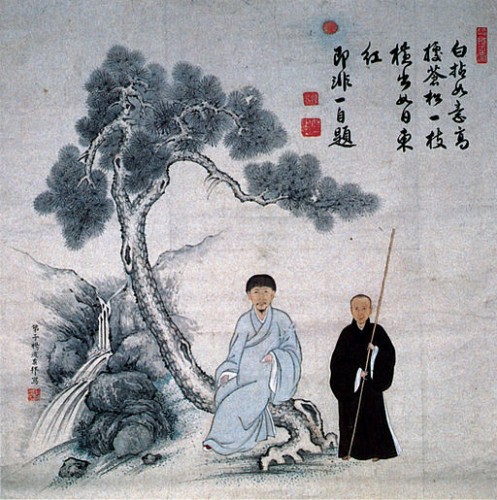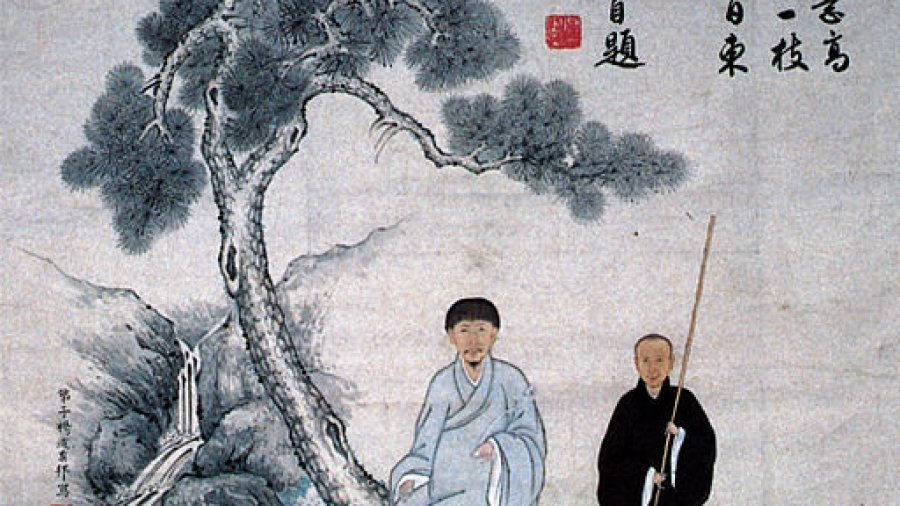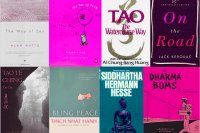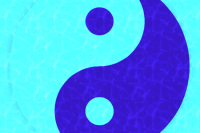“Sitting quietly, doing nothing,
Spring comes and grass grows by itself.”Zenrin Kushû
It is notoriously difficult to define Zen Buddhism. For one, Zen has been co-opted and disfigured by countless ‘new age’, ‘spirit science’ types, transformed into quasi-religious tripe. Furthermore, Zen “masters” themselves have disagreed for centuries as to the importance and validity of various Zen concepts: zazen, karma, etc. Thus there have been innumerable variations and schools of “Zen”.

17th Century Painting of Japanese Zen Monks. Photo Credit: Wiki Commons
Most formative in my experience of Zen have been the writings of the philosopher Alan Watts—particularly his discussions and mentions of Zen in the books The Way of Zen, The Book: On the Taboo Against Knowing Who You Are, and In My Own Way. Anyone who has encountered Watts’ work knows that he had an unmatched knack for communicating the nearly inarticulable concepts of certain strains of Eastern thought for Western audiences. In The Way of Zen, he wrote:
“Zen Buddhism is a way and a view of life which does not belong to any of the formal categories of modern Western thought. It is not religion or philosophy; it is not a psychology or a type of science. It is an example of what is known in India and China as a “way of liberation,” and is similar in this respect to Taoism, Vedanta, and Yoga. As will soon be obvious, a way of liberation can have no positive definition. It has to be suggested by saying what it is not, somewhat as a sculptor reveals an image by the act of removing pieces of stone from a block.”
Zen is a way of life and mind that rejects the idea—preeminent in the Western tradition of thought—that words and linear, rational thinking are the most effective tools we have for understanding existence. Thus, structured descriptions of Zen are actually antithetical to its essence. In fact, the first principle of Zen, articulated by the philosopher Lao Tzu, is ‘Those who know don’t say, and those who say don’t know.’
Nonetheless, people have tried to “say”, thankfully. From some of those people I’ve learned that Zen emphasizes a kind of intuitive understanding—an understanding, which, if attained, can liberate one from much of the contradiction and existential anxiety of ordinary life. The contents of that understanding are quite difficult to communicate, but some folks have made noble efforts (Watts’ The Way of Zen is a great starting point). In a brilliant essay on Aeon that you should totally read if you’re interested in Zen, Tim Lott did an admirable job of characterizing the fundamental Zen realization:
“The word Zen is a Japanese way of pronouncing chan, which is the Chinese way of pronouncing the Indian Sanskrit dhyana or sunya, meaning emptiness or void. This is the basis of Zen itself — that all life and existence is based on a kind of dynamic emptiness (a view now supported by modern science, which sees phenomena at a subatomic level popping in and out of existence in a ‘quantum froth’).
In this view, there is no ‘stuff’, no difference between matter and energy. Look at anything closely enough — even a rock or a table — and you will see that it is an event, not a thing. Every ‘thing’ is, in truth, happening. This too, accords with modern scientific knowledge. Furthermore, there is not a ‘multiplicity of events’. There is just one event, with multiple aspects, unfolding. We are not just separate egos locked in bags of skin. We come out of the world, not into it. We are each expressions of the world, not strangers in a strange land, flukes of consciousness in a blind, stupid universe, as evolutionary science teaches us.
The emphasis on the present moment is perhaps Zen’s most distinctive characteristic. In our Western relationship with time, in which we compulsively pick over the past in order to learn lessons from it and then project into a hypothetical future in which those lessons can be applied, the present moment has been compressed to a tiny sliver on the clock face between a vast past and an infinite future. Zen, more than anything else, is about reclaiming and expanding the present moment.”
Zen sees existence as a single event or process from which we humans are inextricable as trees or quarks or televisions. Though the process of existence has innumerable transient attributes and forms, everything possesses the same essential nature—i.e. everything exists on the same fundamental ground of being. Call it the Tao or the Buddha-nature or the quantum world; it doesn’t really matter. The idea is the same and is distilled, with characteristic spice, by Chuck Palahniuk in his novel, Fight Club: “You’re the all-singing, all-dancing crap of the world.” You, yes, you.
At one time, this idea would have been heretical, but it really isn’t any longer. It’s empirically demonstrable that I am made of the very same stuff as you and everything else. The idea even has popular culture representation in the form of YouTube videos of Neil deGrasse Tyson telling millions of people that they are star-stuff.
But Zen is about more than intellectually grasping the sameness of our subatomic constitution. It’s about experiencing the truth of that sameness, of the mysterious, effortless unfurling of all being, and of the vitality of the present moment and allowing that experience to express itself in one’s life, from the way one interacts with people to the way one approaches any project or activity. Alan Watts characterized it as follows in In My Own Way:
“For Zen, as [D.T.] Suzuki exemplified it, was spontaneously intelligent living, without calculation, and without rigid conceptual distinctions between self and other, knower and known.”
Zen is of course about more than I can say here. If you’re intrigued, I emphatically urge you to check out Watts’ The Way of Zen and the essay by Tim Lott that I mentioned above.
Zen Sayings
Zen has a rich tradition of sayings, proverbs, stories, and kōans that tend to be unorthodox, roundabout, or experimental means of pushing a subject toward an understanding of Zen concepts. Zen sayings and stories can be poetically simple or irksomely confounding or both, but they rarely fail to be interesting. So, in hopes of delighting you, deepening your perspective, or furthering your interest in Zen, here are 40 Zen sayings, Internet-people:
“Not the wind, not the flag; mind is moving.”
“The instant you speak about a thing, you miss the mark.”
“The whole moon and the entire sky are reflected in one dewdrop on the grass.”
Dogen
“What is inexpressible is inexhaustible in its use.”
“In the scenery of spring, nothing is better, nothing worse; the flowering branches are; some long, some short.”
Eicho
“One moon shows in every pool, in every pool the one moon.”
“The frog in the pond knows little of the great ocean.”
“If you do not get it from yourself, where will you go for it?”
“The fundamental delusion of humanity is to suppose that I am here and you are out there.”
Yasutani Roshi
“No snowflake ever falls in the wrong place.”
“If you understand, things are just as they are; if you do not understand, things are just as they are.”
“Better to see the face than to hear the name.”
“If you wish to know the taste of seawater and you live on an island, set out towards the coast and keep going. When you reach the seashore all you then need to do is to bend down, put the finger into the water, and then into the mouth and you will know the taste of all the seven seas. So it is with freedom, it has but one single taste.”
Hakuin
“Do not seek the truth, only cease to cherish your opinions.”
“From the withered tree, a flower blooms.”
“If you meet the Buddha, kill him.”
Linji
“To cry and not be carried away by tears, to laugh and not be carried away by laughter, is the way.”
“Before enlightenment, I chopped wood and carried water. After enlightenment, I chopped wood and carried water.”
“If you want a certain thing, you must first be a certain person. Once you are that certain person, obtaining that certain thing will no longer be a concern of yours.”
“Knock on the sky and listen to the sound.”
“Let go over a cliff, die completely, and then come back to life — after that you cannot be deceived.”
“Sitting quietly, doing nothing,
Spring comes and grass grows by itself.”Zenrin Kushû
“An eternity of endless space: A day of wind and moon.”
“The wild geese do not intend to cast their reflection; The water has no mind to retain their image.”
“Heaven and earth and I are of the same root,
The ten-thousand things and I are of one substance.”Zen Master Sêng-chao/Sõjõ
“Ocean of pure Reality,
Its substance, in fathomless quiescence, exists eternally.”Ch’an master Fo-kuang Ju-man
“Only when you can be extremely pliable and soft can you be extremely hard and strong.”
“The Great Way is not difficult for those who have no preferences.”
“Speech is blasphemy, silence a lie. Above speech and silence there is a way out.”
I-tuan
“When you forget the good and the non-good, the worldly life and the religious life, and all other dharmas, and permit no thoughts relating to them to arise, and you abandon body and mind—then there is complete freedom. When the mind is like wood or stone, there is nothing to be discriminated.”
Pai-chang Huai-hai
“The tighter you squeeze, the less you have.”
“Two hands clap and there is a sound. What is the sound of one hand?”
Hakuin Ekaku
“Without thinking of good or evil, show me your original face before your mother and father were born.”
Huìnéng
“In singing and dancing is the voice of the Law.”
“He who seeks to persuade does not convince.”
“You may wish to ask where the flowers come from, but even the God of Spring doesn’t know.”
“Miraculous power and marvelous activity—
Drawing water and hewing wood!”
“This very earth is the Pure Land, And this very body the Body of Buddha.”
“We eat, excrete, sleep, and get up;
This is our world.
All we have to do after that–
Is to die.”Ikkyu
“Nothing is left to you at this moment but to have a good laugh.”
If this was zen-tastic, read the mission and subscribe.
About Jordan Bates
Jordan Bates is a Lover of God, healer, mentor of leaders, writer, and music maker. The best way to keep up with his work is to join nearly 7,000 people who read his Substack newsletter.





ṇice list of quotes- Dogen’s moon in a dewdrop is a personal favorite (and contains the implicit microcosm-macrocosm correlation). Here’s another one of his from Uji (“Time-Being”): “The way the self arrays itself is the form of the entire world…Thus the self setting itself out in array sees itself. This is the understanding that the self is time.” (Dogen, “Uji,” 77) Lott is sort of right with “sunya” as emptiness, though the Indian word for chan/zen is “dhyana,” which translates to meditation (such as in ‘zazen’ [sitting meditation], though there are a bunch of subdivisions of this in Buddhist and… Read more »
Thank you , can you explain the quote?
https://www.dropbox.com/s/5ji64d2g87lmbsf/The%20Implications%20of%20Dogen%E2%80%99s%20Uji%20on%20the%20Individual%20and%20Practice-Realization.doc?dl=0 (sorry i didnt see your reply til now, hope this helps 🙂
“Knock on the Sky, and listen to the Sound”
“The instant you speak about a thing, you miss the mark.”
As a commercial pilot-pilgrim-wanderer-dreamer I love the first quote.
As a blogger/scribbler, I believe I totally understand the second.
Soft thoughts…
thanks for the comment, francis. i love both of those quotes too. “soft thoughts” is a good way to put it. peace, my friend